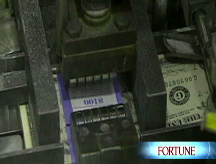Fair-value accounting: Here to stay
While changes are needed, a proponent concedes, mark-to-market accounting does a fair job of assessing a company's financial health.
 |
| SEC chairman Christopher Cox thinks mark-to-market accounting could use some revisions, but a wholesale makeover seems unlikely. |
NEW YORK (Fortune) -- Fair value accounting is still fair game for attack, but there may be more common ground than imagined between critics and proponents of the rules governing how financial firms value the securities they hold.
The Securities and Exchange Commission at a Wednesday roundtable heard comments on fair value, or mark-to-market bookkeeping, which requires firms to value securities in their portfolio at, well, market prices.
Such accounting arcana has turned into a political football in recent months as firms were forced to write down the value of debt for which few buyers existed - like mortgage-backed securities in a deflating real estate bubble. SEC chief Christopher Cox said Wednesday that the fair-value standards need "further work."
He wasn't alone. Though fans maintain the fair-value approach results in greater transparency for investors, critics such as former Federal Deposit Insurance Corp. chief William Isaac argue that it does no such thing.
Worse, they say, it's intensifying the financial-sector meltdown by forcing banks to write down the value of debt securities even if the loan payment streams behind them are flowing satisfactorily.
"[M]ark-to-market accounting has been extremely and needlessly destructive of bank capital in the past year, and is a major cause of the current credit crisis and economic downturn," Isaac said in prepared remarks.
"The rules have destroyed hundreds of billions of dollars of capital in our financial system, causing lending capacity to be diminished by ten times that amount." (Banks typically lend out around ten times their capital.)
Caught in the middle is the Financial Accounting Standards Board, the private-sector group that sets U.S. accounting rules along with the SEC.
Despite the lively debate, one expert says there is more common ground than might be initially apparent - which, in his view, means the mark-to-market rules are likely here to stay.
"Those who looked like polar opposites were actually much closer than they appeared," says David Larsen, a managing director at financial advisory firm Duff & Phelps and a member of the FASB committee that advises the board on fair-value accounting issues. "The task now is to harmonize the conflicting views."
Isaac's broadsides aside, Larsen says he believes many comments made at Wednesday's meeting show that critics of the mark-to-market regime often misunderstand the current rules and how they should be applied. Proponents and critics of the rules, he says, often agree on some principles but don't know it because they're "speaking different languages."
That observation, he says, gives the FASB and the SEC latitude to possibly issue further guidance and make minor changes to the rules, without throwing them out - a move that he said would reduce whatever insight investors have into often opaque financial firms.
One aspect of the fair-value approach that may need adjusting, Larsen says, revolves around how to hold accountants, auditors and financial executives accountable for the judgments they make in assessing the value of an infrequently traded security.
He says that one common misperception centers on what happens when a recent trade has been at a fire-sale price. He takes the example of Merrill Lynch's (MER, Fortune 500) agreement in July to sell a $30.6 billion portfolio of troubled debt to Lone Star funds for 22 cents on the dollar.
Fair value rules don't force holders of similar securities to use 22 cents as their mark, Larsen says. But he says some comments made by opponents of the fair value rules suggest they believe otherwise - and he fears that accountants and auditors who recall Arthur Andersen's prosecution for its mishandling of Enron's books may see things the same way.
"We have people who are doing the right thing who are just afraid of making a mistake," said Larsen. He says one thing regulators might consider is some sort of safe harbor that would permit accountants to make difficult securities-valuation judgments without the risk of jail time.
Those aren't the only changes that may come to the fair-value regime. The FASB is working on adding disclosure requirements, Financial Week reported, that would help investors and analysts more fully understand the types of assumptions firms made in valuing infrequently-traded securities.
Wednesday's roundtable came about as a result of the passage earlier this month of the Emergency Economic Stabilization Act, which directed the SEC to study the economic impact of fair-value accounting. The agency is due to hold another roundtable next month and to report back to Congress by Jan. 2.
Larsen, for one, believes the fair value rules are here to stay, even if their form is apt to change at the margins. "My sense is that investors want and need transparency," he said. "That's out of Aladdin's lamp, and you can't push it back in." ![]()
-
 The retail giant tops the Fortune 500 for the second year in a row. Who else made the list? More
The retail giant tops the Fortune 500 for the second year in a row. Who else made the list? More -
 This group of companies is all about social networking to connect with their customers. More
This group of companies is all about social networking to connect with their customers. More -
 The fight over the cholesterol medication is keeping a generic version from hitting the market. More
The fight over the cholesterol medication is keeping a generic version from hitting the market. More -
 Bin Laden may be dead, but the terrorist group he led doesn't need his money. More
Bin Laden may be dead, but the terrorist group he led doesn't need his money. More -
 U.S. real estate might be a mess, but in other parts of the world, home prices are jumping. More
U.S. real estate might be a mess, but in other parts of the world, home prices are jumping. More -
 Libya's output is a fraction of global production, but it's crucial to the nation's economy. More
Libya's output is a fraction of global production, but it's crucial to the nation's economy. More -
 Once rates start to rise, things could get ugly fast for our neighbors to the north. More
Once rates start to rise, things could get ugly fast for our neighbors to the north. More










